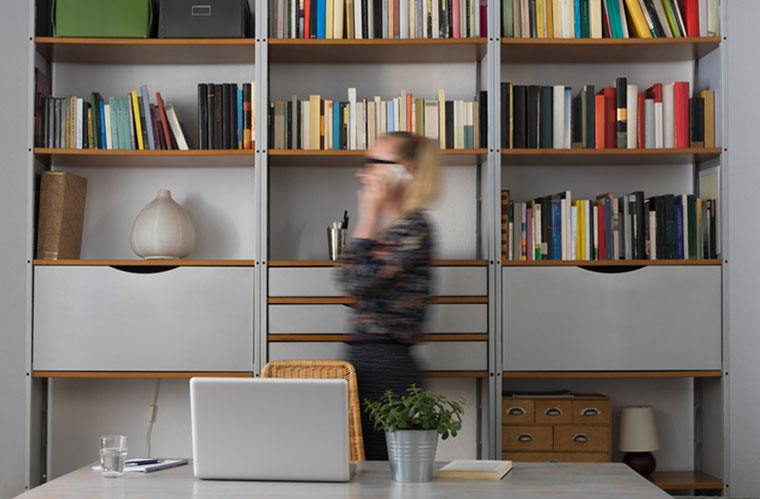Can You Actually Get Ahead at Work These Days Without Risking Burnout?
In our latest Plus Factor, we're talking work stress. It's just something we all have to deal with, right? Yes, but a new generation of entrepreneurial, rise-and-grind professional women may be cheerleading themselves into unhealthy, self-destructive behavior.
When I scroll through my Instagram feed on any given day, I’m inevitably met by a parade of cheerleader-y memes hashtagged #bossbabe, rendered in pastel colors and punchy notebook-doodle script. “Good things happen to those who hustle,” one may say. “Working hard for something we love is called passion,” proclaims another. “Push yourself, because no one will do it for you,” reads a third. (Yikes!)
All these 9-to-5 (er, 9-to-9?) pep talks make me feel torn. On one hand, it’s undeniably great that women are so earnestly encouraging each other to chase after their own success, whether that means killing it at the office or creating their own entrepreneurial empires. Indeed, the prevailing “girlboss” narrative is a seductive one—if you just hustle hard enough and guzzle enough triple-shot lattes, you, too, can have a career that infuses your life with purpose, lets your creative flag fly, and pays you just as much as the dude in the next cubicle.
But at the same time, I’ve always felt that a major plot point has been left out of the story: the fact that all this striving can be seriously bad for your health. This reality most recently emerged from the shadows courtesy of Grace Bonney, founder of Design Sponge and entrepreneurial girl-crush object, whose 2016 book In the Company of Women is proudly displayed on countless Parsons desks.
On the surface, Grace Bonney has achieved what so many members of the side-hustle generation covet—but behind the scenes of what appeared to be a dream career, she’s been struggling, hard.
On the surface, Bonney has achieved what so many members of the side-hustle generation covet—what started as her personal blog in 2004 has evolved into a thriving, multi-platform digital media business. But behind the scenes of what appeared to be a dream career, she’s been struggling, hard.

{{post.sponsorText}}
“For the past year I’ve been working non-stop and feeling overwhelmed with the weight of some big questions that I haven’t been brave enough to admit here,” Bonney wrote on Instagram last month, announcing that she’d be taking a two-month creative sabbatical to help regain the spark she’d lost to burnout. (In reality, that sabbatical only lasted a few days before Bonney decided to embark on a new project.) “Today’s online world prizes busy-ness and non-stop hustle (for better and for worse) and I think it’s good to remember (and remind myself) that for every bit of hustle and stress you need an equal amount of rest and restoration.”
Bonney’s far from the only one feeling this way. Mention the word “burnout” to just about any woman, and chances are she’ll share a story about how it’s personally affected her. To be fair, the concept is not new—burnout’s been considered a side effect of helping professions, such as health care and teaching, for decades. (Both are super-stressful industries with a high emotional labor load.) But in our hyper-connected digital world, burnout is reaching epidemic proportions across all industries, and among women, in particular. According to the General Social Survey of 2016, 50 percent of people said they’re often or always exhausted due to work—a 32 percent increase over the past 20 years.
Psychiatrist Samantha Boardman, MD, has seen this shift firsthand in her practice. “People used to come to see me at big inflection points and transitions—work stress and the daily grind did not take center stage,” she says. “Today, it is more about the endless stream of daily demands. Women’s lives feel like a game of whack-a-mole, and [they’re experiencing] a general lack of vitality.”
All of this is prompting some pretty important discourse about why, exactly, we feel like we have to drive ourselves into the ground to get ahead—while our well-being lags further and further behind.
Here's why women are burning out at an unprecedented rate—and how to deal if it's happening to you.

The burnout epidemic is real
So what’s the difference between true burnout and a simple bout of busy-ness? According to social scientists, there are three key symptoms that characterize the condition: overwhelming exhaustion, feeling cynical and detached from your job, and a sense of ineffectiveness or lack of accomplishment. (There’s a quiz you can take to find out if you’re suffering from it—although, if you’ve ever been burned out before, chances are you didn’t need a questionnaire to tell you.)
While burnout has traditionally been linked with low job engagement, research shows that it’s becoming more and more common among those who are highly engaged with their work—that’s to say, people who genuinely like their jobs and hustle hard because they want to, not because they're forced to. Another myth is that it requires decades of toiling in the workplace before you find your proverbial tank on E. A recent McKinsey study revealed that some women are burning out at work as early as their 20s.
Jess Davis, creator of "slow media" brand Folk Rebellion, is one example of an ultra-passionate worker bee whose dedication to her job once backfired. “I was the stereotypical plugged-in New Yorker, wearing 'busy' like a badge of honor,” says Davis, recalling her life pre-Folk Rebellion. “My career had taken off, and after winning awards and gaining more clients [as a digital strategist], I started to get really sick in my head. [I had] brain fog and disassociation. Memory, attention, and creativity were all lacking. I knew something was wrong, but I didn’t know what and neither did my doctors.”
Physical signs of burnout include fatigue, GI issues, insomnia, poor productivity and executive function, an inability to concentrate, and difficulty making decisions.
These are all pretty classic symptoms of burnout. According to Tania Elliott, MD—chief medical officer of the nationwide preventive health company EHE—physical signs of burnout include fatigue, GI issues, insomnia, poor productivity and executive function, an inability to concentrate, and difficulty making decisions. And they may not even be the most sinister repercussions. For instance, a 2016 study showed strong links between burnout and depression symptoms, while burnout has also been shown to increase inflammation markers in women. And you don’t even need to be clocking serious overtime to experience the ill effects of overwork—just 45 hours of work per week may increase a woman’s risk of diabetes, according to new research.
The scariest part? Many people with burnout don’t even realize anything is wrong. “Those who are experiencing burnout are often the last to recognize it because it is an insidious and gradual process,” says Dr. Boardman. “You don’t wake up one morning and realize you have it like you do with the flu. More often than not, it is the person’s partner or co-workers who pick up on it.”

So why are we all burning out, anyway?
There’s a whole cocktail of factors that are contributing to the meteoric rise in burnout among women—and they go far deeper than just the obvious explanations we’ve heard a million times. (You know, the fact that we’re all addicted to our email and struggling to juggle work pressures with home and family.)
For one thing, women are starting their own businesses at an unprecedented rate. According to USC Marshall School of Business, female-owned companies have grown at 1.5 times the rate of other small businesses over the last 15 years, a trend that’s showing no sign of slowing down. And while this is great news on a whole lot of fronts, it does create the perfect environment for burnout.
Claire Wasserman, Well+Good Council member and founder of career education and networking platform Ladies Get Paid, can attest to this. “The first year I started Ladies Get Paid, I was probably in front of my computer for 12 hours a day—and honestly, you need to work that much when you’re starting a business,” she recalls. (Your bills aren’t going to pay themselves, after all.) “There’s more pressure on women who have their own businesses, because they’re largely in control of their own destiny. I felt like every hour I didn’t work was an hour less of my success.”
But that’s not to say that burnout is exclusively a disease of the self-employed. Wasserman points out that most members of Ladies Get Paid work for other people, and that it’s a huge problem for them, as well. “For these women, burnout is less about trying to be a boss lady—it comes more from the pressure to be perfect,” she says. “It’s more ‘I don’t want to make mistakes, I want to do the best I can.’ And I think this comes from the way women are socialized [as children.]"
"Women are leaning in so hard they are falling on their faces.”—Jess Davis, Folk Rebellion
This drive towards perfectionism may also have to do with the fact that women are still lagging behind men in both pay and title at work, says Dr. Elliott. “Women—who were already working just as hard as men—may work even harder because they feel like they have something to prove to justify a compensation adjustment,” she says. Dr. Boardman agrees with this sentiment. “Women will go overboard to show that they take their job seriously,” she says. “They are more likely to not use their vacation time than men. Also, more women than men think it is a good thing for their boss to see them as a work martyr.”
But perhaps the most surprising burnout trigger of all, says Davis, is unfairly comparing ourselves to other successful women. “I was working in corporate America when Sheryl Sandberg wrote Lean In,” she says. “My son was two at the time and I was rushing between meetings, hiding in bathrooms to pump, and feeling guilty about getting home to put him to bed—then overcompensating by staying up until 2 a.m. to show how devoted I was. This was the same year that Marissa Meyer bragged about taking basically no days off after giving birth.”
These messages, though well-intentioned, may be dangerous for women who don’t have the same privilege and resources behind them, Davis adds. “They are at the top of the food chain and spouting into the world that you need to hustle, grind, and focus on work—even with kids. But women are leaning in so hard they are falling on their faces.”

What can you do about it?
Unfortunately, research shows that escaping to Cabo for a few days isn’t going to cure your burnout—although you may feel better temporarily after getting back. (Grace Bonney of Design Sponge, for one, wrote that taking even a few days off helped her find the mental clarity she was seeking from a longer sabbatical.) So what is the answer?
The first thing is to realize that your current habits are hurting you more than they’re helping you. “There used to be a culture that working longer hours meant you were more dedicated and doing a better job,” says Dr. Elliott. “But studies have shown that this isn’t the case. In fact, people who don’t get a good night’s sleep and those who take fewer vacations are less productive, more irritable, and are less able to make crisp executive decisions.”
Instead, says Davis, you should focus on time management and working smarter, so that work is less likely to spill over into your OOO time. “Define the 20 percent of things that will really move the needle of the business and focus on that,” she suggests. “The most successful women I know spend their time compartmentalized. When they are at work they're all in, not taking personal calls or scrolling Instagram. And when they are out of work, they're out—refueling themselves with time off, time with family and friends, and time with things that make them happy.”
"Tell [your boss] you've been getting burned out and ask for their guidance, but always come with suggestions of solutions so you're not seen as complaining."—Claire Wasserman, Ladies Get Paid
Wasserman adds that relationship-building should also be high on your priority list at work. “What gets recognized and rewarded at work is not really the hours spent heads-down, doing the work,” she says. “It’s the relationships with your managers.” This will also help you feel more comfortable talking to your boss if your workload is more than you can handle.
"Transparency is key," Wasserman stresses. "Tell them you've been getting burned out recently and ask for their guidance, but always come with suggestions of solutions so you're not seen as complaining. Getting on the same page as them on what needs to be accomplished ASAP, what can wait, and what can be delegated will probably help solve a lot—and establish better communication moving forward."
Dr. Boardman adds that having good relationships at work is also one of the best ways to help prevent burnout in the first place. “If you spend a lot of time in an office, it’s important to cultivate social connections. Studies show it makes work more satisfying, more enjoyable, and more engaging,” she says.
And finally, says Wasserman, some self-inquiry is always required when battling burnout. “Part of it is that therapy work of recognizing where the pressure comes from,” she says. “I do think you have to check yourself and ask, ‘Does what I do, at this point, require such commitment?’”
Either way, don’t expect your recovery to happen overnight. “It’s been about a year since I stopped working at the insane pace that I was before, and I’ve gotten a lot better, but it’s almost like I’m a recovering addict,” says Wasserman. Luckily, the cultural tides are turning, which should help many of us feel less guilty for dialing back on our to-do lists. Even the official Girlboss Instagram account has started preaching self-care over seven-day work weeks. A social feed filled with memes proclaiming "Productivity isn't everything" and "Protect your goddamn energy?" Aaand, breathe.
Go on, book that last-minute summer vacation—it's actually really good for your career. You can start by consulting this list of the best places to swim in every state.
Loading More Posts...